Growing up watching detective serials and movies, everyone wants to become a detective. After knowing the character of Sherlock Holmes, we assume to be like him. However, somewhere along the way, we forget this dream of ours and work towards more “realistic” goals. In recent years, due to the increased rate of crime, there is a greater need for detectives to solve them. This is where some police officers step up and exhibit the Sherlock Holmes in them. For those of you who still haven’t given up on your detective dreams, here is some information on the exciting career of being a detective.
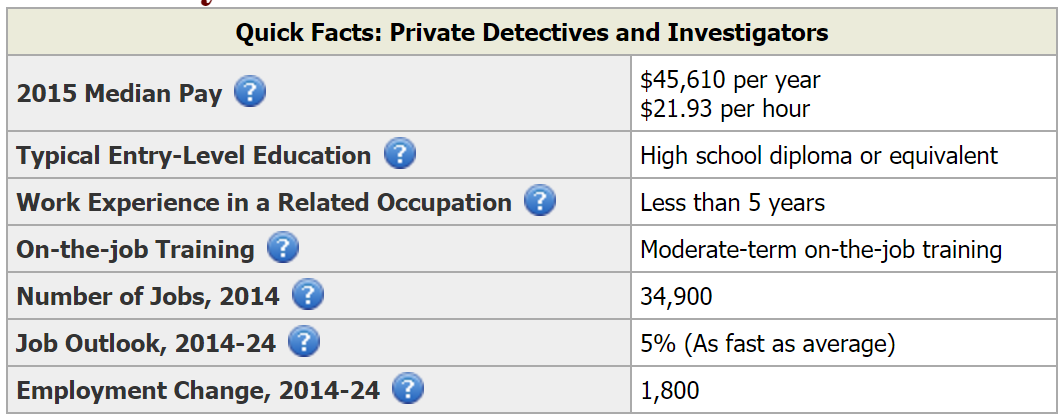

Table Of Contents
- Average Detective Salary
- Detective Career Outlook
- How To Become A Detective
- Detective Job Description
How Much Does A Detective Make
The base salary of a detective first depends on his or her employer. An investigator who is employed by the state earns more than a private one in most cases. This is because a private detective has intermittent work while the state employed has a steady work. The national average for a state-employed detective is $76,000. The average salary for a private detective is around $45,000 only. The factors that affect a PI’s salary will be discussed later. Let’s take a look at the factors affecting a state employed investigators’ salary at the moment.
[asd_program_button /]Size of population
Just like police officers, the income of a detective is dependent on the city’s population. The number of cases to be handled by a detective increases if the city is more populated. Therefore, the salary increases as well. The crime rate also affects the salary of an investigator. For example, the average salary for someone in the LA police department ranges from $44,000 to $88,000. In contrast, for someone in Miami Police department, the average salary tends to be around $86,000 to $107,000.
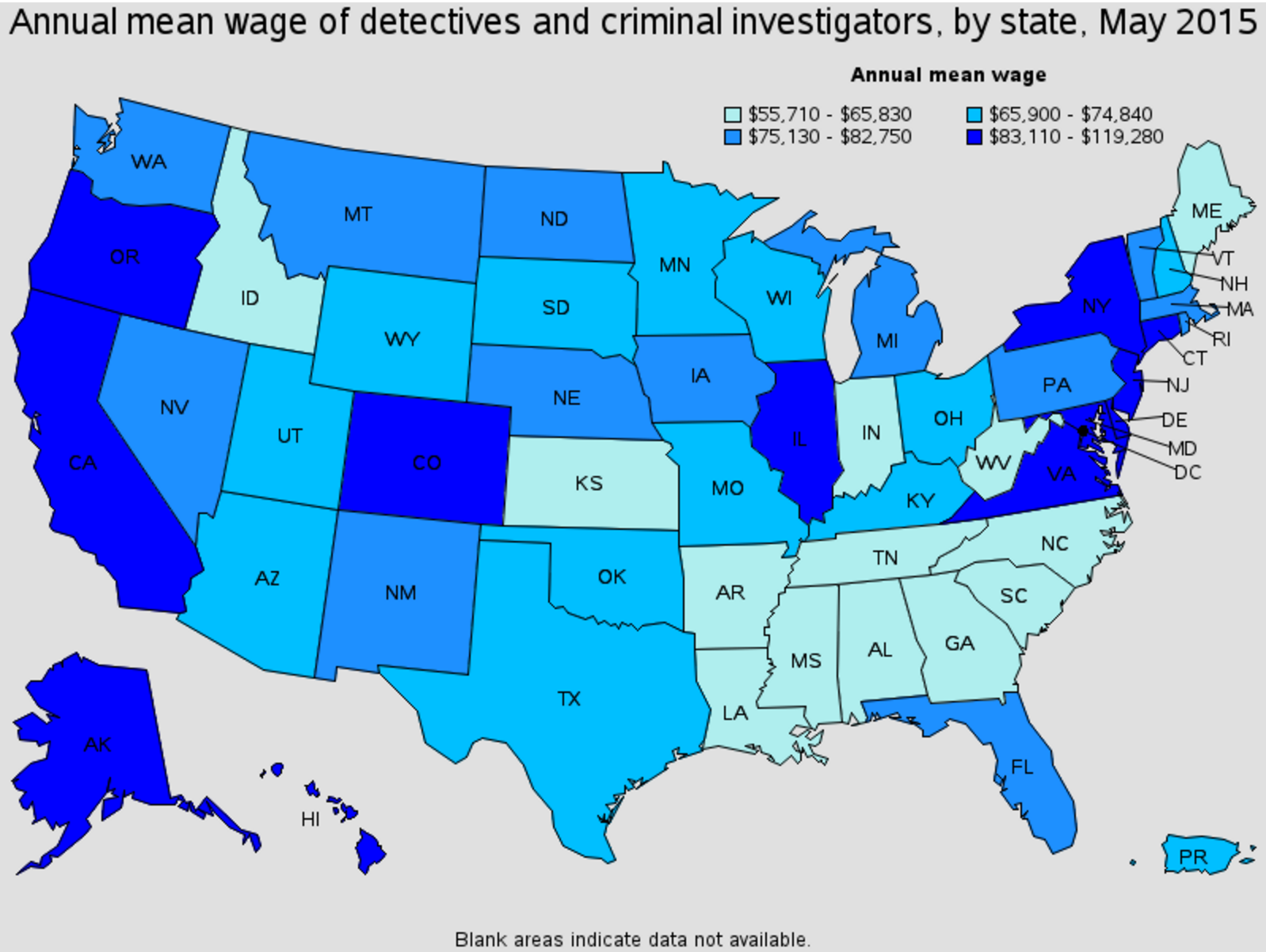
Job location
Crime rate and population of the place are closely related to the location. But there is another factor, which is the cost of living. Higher the cost of living in a certain location, higher the detective is paid. Private investigators will also have this case. District of Columbia, Alaska, and New Jersey all pay 6-figure salaries with District of Columbia paying as much as $116,000.
Level of education attained
A high school degree is sufficient for those who want any police job except for the federal level. States have different rules but a higher education certificate is not necessary in some states. However, officers and detectives are paid more if they have a degree after high school as there are states and departments who consider higher education important. This may be an associate’s, bachelor’s or even a master’s degree. Depending on your degree, you might be paid more.
Experience
You will be paid as an investigator if you will be working in the field for a long period of time. Usually, people see an increase of up to $15,000 with 20 years of experience if they do not get promoted. However, with promotions, if you reach the post of Police Chief, you can earn about $180,000 annually.
Paris Private Investigators
A private investigator’s salary depends on the number of cases he or she takes and solves. The factors that affect the salary as mentioned above include the location, amount of discretion needed, amount of danger involved, required extra equipment and other many things. The price for the job will be quoted by the investigator after the problem is presented by the clients.
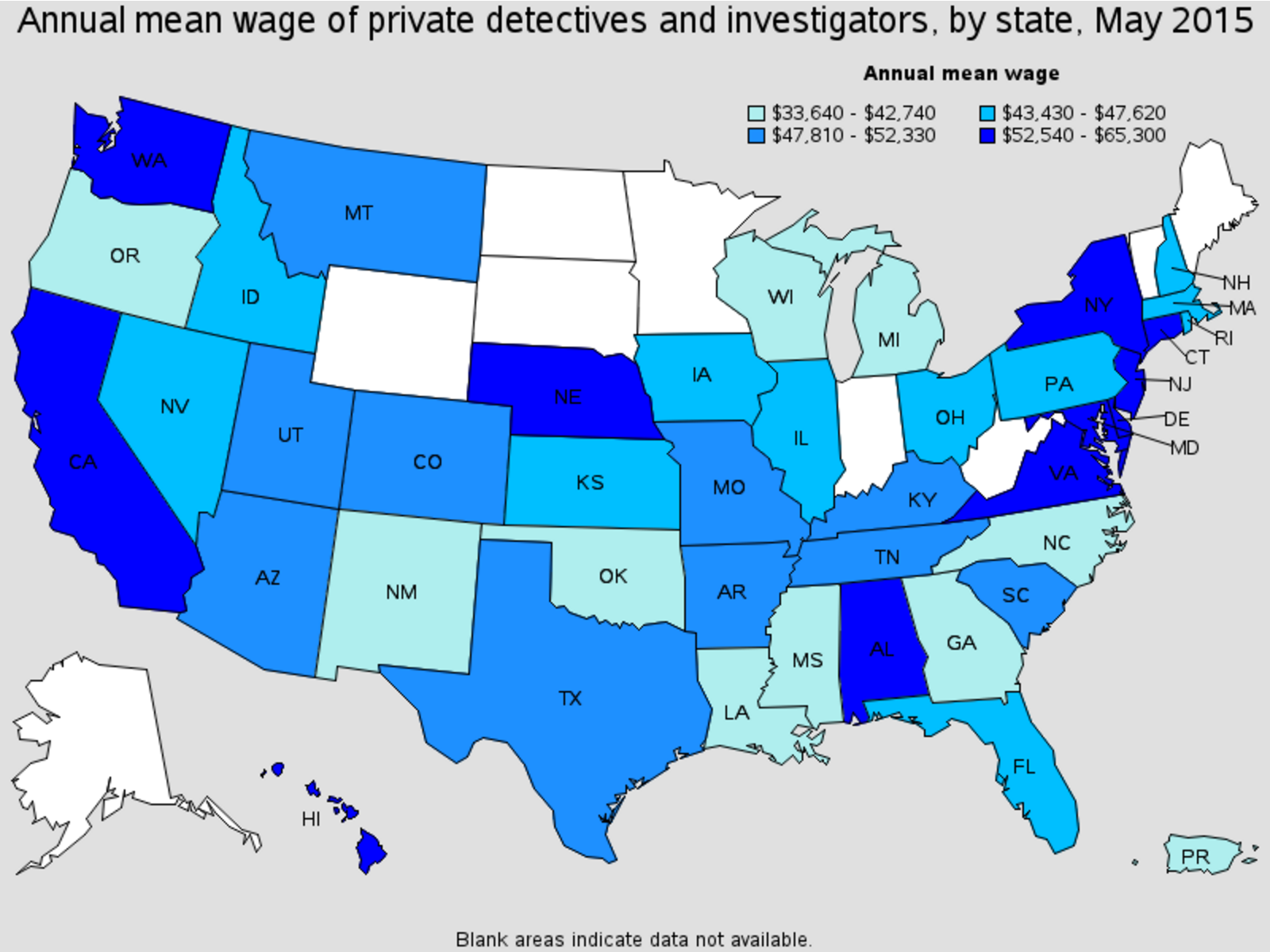
You will know here that a state-employed detective’s income is steady and through various means it can be increased. On the other hand, a private investigator’s salary is quite unpredictable and will only increase if he or she is already popular or known. Based on these financial facts, you will be able to decide the path to go.
Career Outlook of a Paris Detective
First thing first, we will be talking about career growth in this field. In 2015, the recorded public detectives or criminals investigators are about 106,000. On the other hand, there were only about 30,000 private investigators holding a job at the same time. In this industry, the predicted growth of private detectives is about 15%. This means that there will be about 1,500 new jobs open by 2025. This growth rate is following the average growth rate of 5% across all other sectors. On the other hand, for public investigators, this figure is at 4%. This goes to show that 4,000 more jobs as a criminal investigator is expected in 2025. This can be considered as an average rate of growth as well.
[asd_program_button /]The employment increases steadily because the population increases. Because of the increase in population, more people need to be protected and more criminals need to be caught. However, with stricter laws and more advanced technology being use, the crime rate isn’t increasing that significantly. Thus, both the phenomena almost balance each other out leading to an average growth in both these careers.
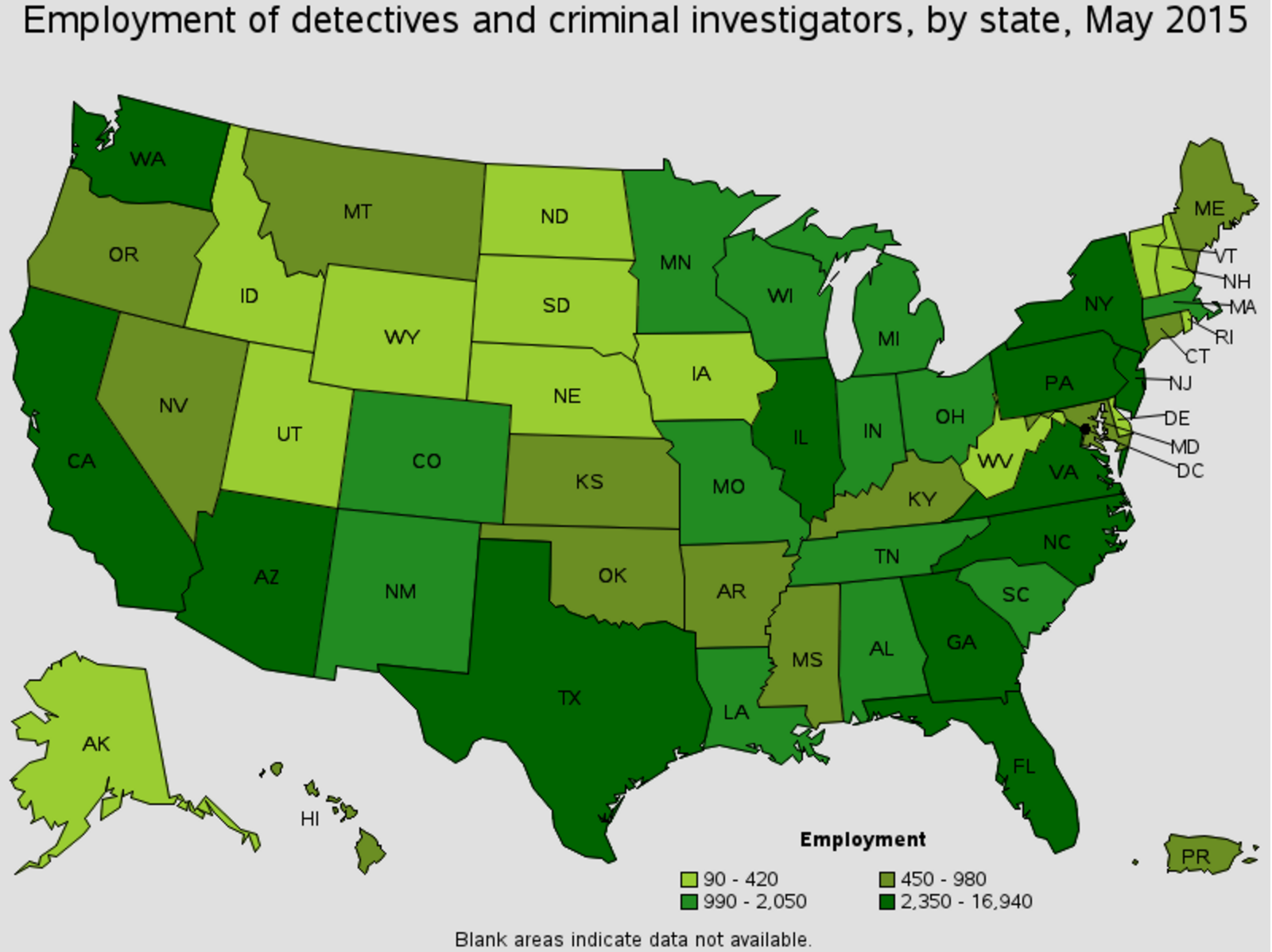
In terms of location, Texas, California and New York have the highest number of Criminal/Law Enforcement Investigators. There are more employments in Western states and Texas compared to the eastern part. Private detectives in California, Texas and Florida with the southern part are higher in number compared to the northern ones.
Let’s move on to the industries that hire most of these two professionals. The Local, State government and the Federal branch are employing a lot of criminal investigators. On the other hand, private detectives are usually hired by Security Services, Consulting services and occasionally by the local government for consultation on a few cases.
When it comes to finance, criminal investigators are paid more compared to the private ones. Their annual average salary is $80,000 (Criminal investigators) and that of Private investigators is around $52,000. When you combine the aspects of geography and finance, you see that District of Columbia, Alaska, and New Jersey paid the most (6 figure salaries) for Public investigators. Private detectives receive higher payment in Alabama, Nebraska, and New Jersey.
Private industries that employ most do not pay the highest in comparison with the different industires. SinceElectromedical, Navigational, Power generation, Metal Product forming and other such industries have to protect sensitive information that is why pirvate detective are paid most by them. Moving on to Public Investigators, federal agencies, postal services, and educational institutes pay the most.
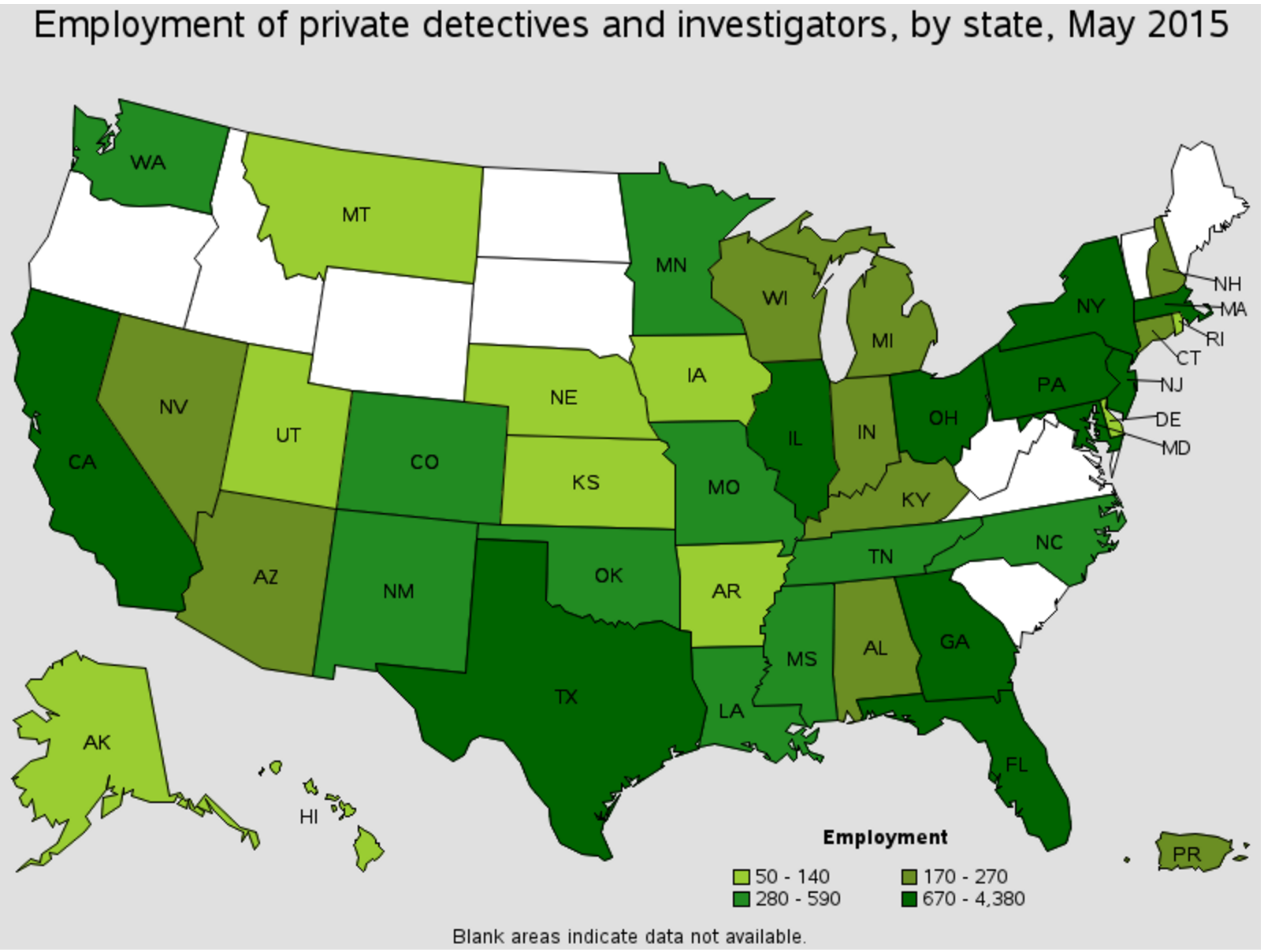
Qualifications to Become a Paris Detective
It is important to note that there are two kinds of detectives. General public can hire some private investigators to investigate certain things. There are those who are government employees and after being promoted as a police officer gets the post. We will explore both avenues here.
[asd_program_button /]Be a High School Graduate
Due to excellent deduction skills, a deductive is able to take a leap from a police officer to a detective position. Thus, a general way in becoming a detective is to first complete high school and get into the police academy to become a police officer. Becoming a private investigator would mean getting a high school degree.
Get Yourself a Bachelor’s Degree
In most cases, enlisting in the police force won’t require a bachelor’s degree. Although some officers would like to have other means of employment right after retirement. A bachelor’s degree is also required to pursue any jobs at the federal level or become a detective.
A bachelor’s degree in either criminal justice or law will be required in most institutions to become a detective. Anyone with an associate’s degree is given training up to 5000 hours. But for someone with a bachelor’s degree, the required training is only 4000 hours.
Get enough experience
To become a professional detective (not employed by the state), you need to have some professional experience as an investigator. You can find several ways to do so. Getting employed by the government is basically the most common method. You will be regarded as a person with experience if you worked as a criminal investigator or an arson investigator. Other than these, you can also choose to Public defender’s office investigator or a licensed repossessor.
Depending on the state you are applying in, the requirements of experience change. There are some that only require 3 years of experience, but some might need at least five.
Acquire a license for your guns
Investigators that aren’t licensed by the state aren’t allowed to carry firearms without a permit. Some firearms will need you to undertake a full training course in order to get your permit. Therefore if you want to own a firearm while working as an investigator, completing the training course is necessary to get your own permit.
Obtain Idaho licensure
Once you have fulfilled the requirements, you will need to take a state licensing examination. The test will include questions regarded state laws and have multiple choices to choose from. The test is only available for those who want to be private detectives. After passing this test, you are officially a private investigator with a license.
File for Idaho insurance
Due to the dangerous nature of the work, you should make sure to get an insurance. Basically, this is a medical insurance worth $10,000. However, getting an even higher amount when you bring a firearm is necessary since you need to have some protection with you.
Simply follow through all steps and you’ll have nothing to worry about. You can now start living the detective life you always wanted. Keep in mind however that there are dangers associated with this line of work. If you are still up for it, find out all the education requirements in detail and get started on them right away!
Responsibilities of Being a Detective in Paris
Crime Scene Investigation
One main role of a detective is to take a look at a crime scene and make certain deductions. He will then collect any evidence he can find in the crime scene. Supposedly, they should collect anything that looks like an evidence which can be used in court hearings later. In some cases, detectives can receive aid from the forensic investigation department, hence allowing them to come up with more deductions regarding the crime. Detectives should gather as many clues and evidences as possible by analyzing cameras and gathering information from eye witnesses.
[asd_program_button /]Criminal Research
An important aspect of a detective’s duties is to research previous case files in their free time. Through this, they can get to the mind of a criminal and discover any hidden clues and patterns. Often, research into the past and previous case files give them an idea or a clue as to how the current culprit might be operating. This is really helpful when it comes to serial killers. This is also applicable when it comes to knowing what tactics a drug cartel is up to. Through the help of general research, it will be a lot easier for detectives to identify the culprit or make any accurate deductions.
Accurately guessing the culprit
The goal of a detective’s job is to bring justice to light and bring the culprit to justice. They will need to have a list of the suspects first before such thing could happen. This suspect pool maybe as big as 100 people or as small as none. They are able to come up with such list by piecing evidences, statements from eye witnesses, results from research, and a bit of forensics altogether. This suspect pool is then narrowed down by getting alibis from some suspects and interrogating others. After they narrow it down as much as possible, they collect hard evidence or get the suspect to confess to the crimes.
Testifying In Court
One of the final jobs of a detective on a case is to ensure that justice is served. To hasten the process, the court will sometimes summon them. They either narrate a possible scenario of how the crime was committed, describe how the evidence incriminates the suspect or provide their expert views on certain topics. Sometimes, the detectives are also required to escort the culprit to jail.
Paris Private Detectives
All the above duties were that of a public detective or a law enforcement detective. Keep in mind that the job of a private detective isn’t as easy as it seems. They will need to fulfill the needs of their clients especially when it comes to research. However, they are allowed to only bend certain laws to a minimalistic extent to help them complete their duties. Private detectives are often hired for tasks such as gathering evidence from someone, monitoring certain individuals, or even tracking finances. They have to be subtle in their ways and act as a normal citizen in carrying out the duties of a detective. Detectives are also prohibited from arresting an individual.
Basically, you can see that the television has been portraying detectives properly for the most part. The thing is, the duties and roles detectives undertake every single day are very stressful. That is never shown properly on television or anywhere else. Detectives should make sure to find any clue they could get since a lot of people’s lives lie on them. If you’re really interested with the job, you should start knowing what it takes to be a detective now!
